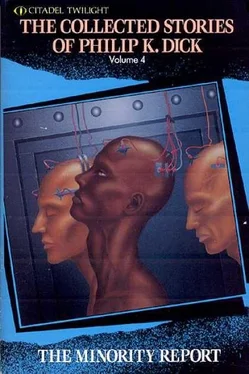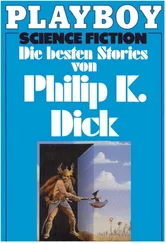I decided to exorcise it by writing about it, and I did write about it, and it did go away. But I had seen the evil one himself, and I said then and say now, "The evil one wears a metal face." If you want to see this yourself, look at a picture of the war masks of the Attic Greeks. When men wish to inspire terror and kill they put on such metal faces. The invading Christian knights that Alexander Nevsky fought wore such masks; if you saw Eisenstein's film you know what I am talking about. They all looked alike. I had not seen Nevsky when I wrote THE THREE STIGMATA, but I saw it later and saw again the thing that had hung in the sky back in 1963, the thing into which my own father had been transformed when I was a child.
So THE THREE STIGMATA is a novel that came out of powerful atavistic fears in me, fears dating back to my early childhood and no doubt connected with my grief and loneliness when my father left my mother and me. In the novel my father appears as both Palmer Eldritch (the evil father, the diabolic mask-father) and as Leo Bulero, the tender, gruff, warm, human, loving man. The novel which emerged came out of the most intense anguish possible; in 1963 I was reliving the original isolation I had experienced upon the loss of my father, and the horror and fear expressed in the novel are not fictional sentiments ground out to interest the reader; they come from the deepest part of me: yearning for the good father and fear of the evil father, the father who left me.
I found in the story The Days of Perky Pat a vehicle that I could translate into a thematic basis for the novel I wanted to write. Now, you see, Perky Pat is the eternally beckoning fair one, das ewige Weiblichkeit – "the eternally feminine," as Goethe put it. Isolation generated the novel and yearning generated the story; so the novel is a mixture of the fear of being abandoned and the fantasy of the beautiful woman who waits for you – somewhere, but God only knows where; I have still to figure it out. But if you are sitting alone day after day at your typewriter, turning out one story after another and having no one to talk to, no one to be with, and yet pro forma having a wife and four daughters from whose house you have been expelled, banished to a little single-walled shack that is so cold in winter that, literally, the ink would freeze in my typewriter ribbon, well, you are going to write about iron slot-eyed faces and warm young women. And thus I did. And thus I still do.
Reaction to THE THREE STIGMATA was mixed. In England some reviewers described it as blasphemy. Terry Carr, who was my agent at Scott Meredith at the time, told me later, "That novel is crazy," although subsequent to that he reversed his opinion. Some reviewers found it a profound novel. I only find it frightening. I was unable to proofread the galleys because the novel frightened me so. It is a dark journey into the mystical and the supernatural and the absolutely evil as I understood it at the time. Let us say, I would like Perky Pat to show up at my door, but I dread the possibility that, when I hear the knock, it will be Palmer Eldritch waiting outside and not Perky Pat. Actually, to be honest, neither has shown up in the seventeen or so years since I wrote the novel. I guess that is the story of life: what you most fear never happens, but what you most yearn for never happens either. This is the difference between life and fiction. I suppose it's a good trade-off. But I'm not sure. (1979)
STAND-BY ("Top Stand-By Job") 4/18/63. Amazing, Oct 1963.
WHAT'LL WE DO WITH RAGLAND PARK? ("No Ordinary Guy") 4/29/63. Amazing, Nov 1963.
OH, TO BE A BLOBEL! ("Well, See, There Were These Blobels…") 5/6/63. Galaxy, Feb 1964.
At the beginning of my writing career in the early Fifties, Galaxy was my economic mainstay. Horace Gold at Galaxy liked my writing whereas John W Campbell, Jr. at Astounding considered my writing not only worthless but as he put it, "Nuts." By and large I liked reading Galaxy because it had the broadest range of ideas, venturing into the soft sciences such as sociology and psychology, at a time when Campbell (as he once wrote me!) considered psionics a necessary premise for science fiction. Also, Campbell said, the psionic character in the story had to be in charge of what was going on. So Galaxy provided a latitude which Astounding did not. However, I was to get into an awful quarrel with Horace Gold; he had the habit of changing your stories without telling you: adding scenes, adding characters, removing downbeat endings in favor of upbeat endings. Many writers resented this. I did more than resent this; despite the fact that Galaxy was my main source of income I told Gold that I would not sell to him unless he stopped altering my stories – after which he bought nothing from me at all.
It was not, then, until Fred Pohl became editor of Galaxy that I began to appear there again. Oh, To Be A Blobel! is a story which Fred Pohl bought. In this story my enormous anti-war bias is evident, a bias which had, ironically, pleased Gold. I wasn't thinking of the Viet Nam War but war in general; in particular, how a war forces you to become like your enemy. Hitler had once said that the true victory of the Nazis would be to force its enemies, the United States in particular, to become like the Third Reich – i.e. a totalitarian society – in order to win. Hitler, then, expected to win even in losing. As I watched the American military-industrial complex grow after World War Two I kept remembering Hitler's analysis, and I kept thinking how right the son of a bitch was. We had beaten Germany, but both the U.S. and the U.S.S.R. were getting more and more like the Nazis with their huge police systems every day. Well, it seemed to me there was a little wry humor in this (but not much). Maybe I could write about it without getting too deep into polemics. But the issue presented in this story is real. Look what we had to become in Viet Nam just to lose, let alone to win; can you imagine what we'd have had to become to win? Hitler would have gotten a lot of laughs out of it, and the laughs would have been on us… and to a very great extent in fact were. And they were hollow and grim laughs, without humor of any kind. (1979)
Here I nailed down the ultimate meaningless irony of war; the human turns into a Blobel, and the Blobel, his enemy, turns into a human, and there it all is, the futility, the black humor, the stupidity. And in the story they all wind up happy. (1976)
The Collected Stories of Philip K. Dick
Volume l – The Short, Happy Life of the Brown Oxford
Volume 2 – We Can Remember It For You Wholesale
Volume 3 – Second Variety
Volume 4 – The Minority Report
Volume 5 – The Eye of the Sibyl










